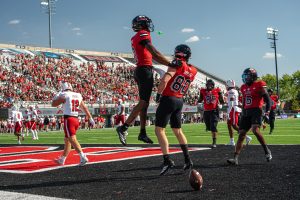Groves to visit campus
August 28, 1989
As the battle for control of the Board of Regents heats up, Regents Chancellor Roderick Groves’ visit to NIU this week is sure to fan the flames.
Groves will be on campus Wednesday to attend the semester’s first Faculty Assembly meeting, to which he was invited to field questions about his proposed changes in Regents policy. The changes have been labelled by many as an attempt to gain greater control of the three Regency schools—NIU, Illinois State University in Normal and Sangamon State University in Springfield.
One item in Groves’ proposal, which he first introduced to the board at the July 26-27 Regents meetings at SSU, would require the presidents of the Regency schools to report to the board through the chancellor. Groves said the proposal is designed to clarify language “subject to misinterpretation.”
In a March 27 memo from Groves to the three Regency presidents and Regents chairman Carol Burns, Groves said he “should become invested to a greater degree in administrative initiatives, decisions and policy matters than has been the case in the past.”
Both The Northern Star and the Pantagraph in Bloomington-Normal attempted to obtain copies of the memo under the state’s Freedom of Information Act, and both requests were denied. The Pantagraph obtained the memo through other means and a story in Sunday’s issue quotes the memo at length.
“The basic purpose of the changed procedure is that I be informed of policy or operational concerns, needs events, requests, decisions, etc., at a point in time that allows me satisfactory time to consult with you and make whatever decisions are needed,” Groves wrote in the memo.
Student Association President Huda Scheidelman called Groves’ proposal an attempt to “centralize the board’s power around him,” and she said it is only hurting the Board of Regents. The proposal “hurts the university as a whole” by limiting what the president can say, she said.
Groves has requested that all questions that will be addressed to him at Wednesday’s meeting be submitted to him at least 24 hours in advance. Scheidelman called this “an effort to be able to scrutinize what is asked. It’s silly.”
Groves “should be able to answer whatever questions come up,” she said. The Faculty Assembly meeting will be held at 3 p.m. in room 505 of the Holmes Student Center.
After attending the meeting, Groves will travel to Bloomington-Normal to attend a meeting of ISU’s Academic Senate, a body similar to NIU’s Faculty Assembly, said University Council Executive Secretary Carroll Moody.
Gordon Dorn, NIU art professor and president of the NIU chapter of the American Association of University Professors, said Groves’ proposed changes would “decrease the prestige of the president’s position,” therefore making it “more difficult to attract the best candidates” for the Regency university presidents.
“If the chancellor appears to be usurping the powers of the presidents, really good candidates will be less interested,” Dorn said. “When the presidents start reporting to the chancellor instead of to the board, will the voice of the presidents be muffled?”
Dorn said he is concerned that Groves’ proposed changes would decrease the autonomy of each Regency university, lessen the “uniqueness that each institution has” and strangle the voice of each Regency school.
The NIU chapter of the AAUP will hold an executive committee meeting today to discuss Groves’ proposal. The committee plans to develop a formal response to Groves’ proposed changes for publication in the AAUP newsletter, Dorn said.
Members of the University Council Steering Committee submitted a resolution on Aug. 17 to Regent Harry Wellbank asking for more time to examine Groves’ proposal. Written by Moody, the resolution requested that the Regents defer action on the proposal until the October Regents meeting to allow faculty, staff and students time to consider how the proposal might alter their role “in the internal governance of the university.”
See Groves Page 19
Groves
Continued from Page 1






